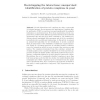Free Online Productivity Tools
i2Speak
i2Symbol
i2OCR
iTex2Img
iWeb2Print
iWeb2Shot
i2Type
iPdf2Split
iPdf2Merge
i2Bopomofo
i2Arabic
i2Style
i2Image
i2PDF
iLatex2Rtf
Sci2ools
73
Voted
RECOMB
2008
Springer
2008
Springer
Bootstrapping the Interactome: Unsupervised Identification of Protein Complexes in Yeast
Protein interactions and complexes are major components of biological systems. Recent genome-wide applications of tandem affinity purification (TAP) in yeast have increased significantly the available information on such interactions. From these experiments, protein complexes were predicted with different approaches first from the individual experiments only and later from their combination. The resulting predictions showed surprisingly little agreement and all of the corresponding methods rely on additional training data. In this article, we present an unsupervised algorithm for the identification of protein complexes which is independent of the availability of additional complex information. Based on a bootstrap approach, we calculated intuitive confidence scores for interactions which are more accurate than previous scoring metrics. The complexes determined from this confidence network are of similar quality as the complexes identified by the best supervised approaches. Despite the ...
Additional Training Data | Computational Biology | Intuitive Confidence Scores | RECOMB 2008 | Tandem Affinity Purification |
| Added | 03 Dec 2009 |
| Updated | 03 Dec 2009 |
| Type | Conference |
| Year | 2008 |
| Where | RECOMB |
| Authors | Caroline C. Friedel, Jan Krumsiek, Ralf Zimmer |
Comments (0)

